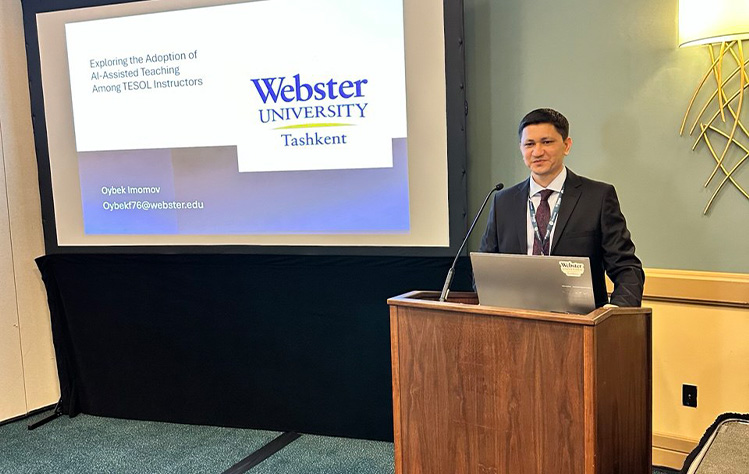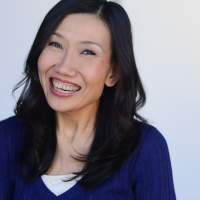AI in TESOL: From EdD Research to Practice
June 04, 2025
 Dr. Oybek Imomov presents a research paper at the 2025 TESOL Convention
Dr. Oybek Imomov presents a research paper at the 2025 TESOL Convention
In May 2025, Dr. Oybek Imomov earned his Doctor of Education degree from Webster University, capping off a research journey that bridges academic inquiry with real-world impact. As a higher education professional and TESOL instructor at Webster University in Tashkent, Dr. Imomov has been exploring how artificial intelligence can enhance English language instruction in university classrooms.
A Vision Rooted in Practice
Dr. Imomov’s research focuses on how TESOL instructors are adopting AI-assisted teaching
tools, particularly in higher education settings. His work is driven by a timely question:
How can educators use AI tools like ChatGPT-4 to improve instruction while preserving
the essential human connection in language learning?
His findings suggest that AI, when used thoughtfully, can support instructors by personalizing
learning, automating administrative tasks and increasing student engagement. Rather
than replacing educators, AI can serve as a powerful partner in the classroom.
Sharing Insights on the Global Stage
At the TESOL 2025 International Convention, Dr. Imomov presented his preliminary findings to a global audience of educators and researchers. His session highlighted how AI tools are already being used to streamline lesson planning, generate feedback and support differentiated instruction in multilingual classrooms.
Reflecting on the experience, Dr. Imomov shared, “Attending the TESOL 2025 Convention was an incredible experience. I presented my preliminary research findings on exploring the usage of AI tools such as ChatGPT-4 in improving teaching instruction among TESOL educators. In my presentation, I covered how AI assists in customized learning, helps with the completion of administrative tasks and enhances lesson delivery. Another important thing for me was to address the concerns that teachers have regarding the replacement of their roles by AI. I emphasized that these tools are intended to assist but not replace educators.”
He also noted the growing momentum around AI in the TESOL field. “During the conference, it was clear that there is a growing interest in the topic of AI in teaching amongst TESOL educators. Numerous presenters described their experiences with AI in lesson preparation, grading, and providing constructive feedback to students. I also took part in some practical workshops that focused on using AI, which were inspiring.”
Ethics, Equity and the Future of TESOL
Dr. Imomov emphasized that ethical considerations were a major theme at the conference. “One of the important issues was ethics, particularly student privacy and equitable access to technology. I gained valuable knowledge from attending these sessions and deepened my critical reflection on how to address such concerns in my research and future implementations.”
Following the convention, he co-led a workshop titled “Navigating AI in Education”
at Webster University in Tashkent.
“It generated a lot of interest from teachers,” he said. “Many participants were very
enthusiastic to explain how AI could be applied within their teaching practice and
were interested in finding effective ways to incorporate AI into teaching.”
A Lasting Impact
Dr. Imomov’s doctoral journey exemplifies the mission of the School of Education at Webster University: To prepare educators who are innovative, reflective and committed to making a difference.
His research continues to inform professional development initiatives and curriculum design at Webster Tashkent and beyond. “Overall, the conference reinforced the significance of my research topic and inspired me to continue exploring.”

